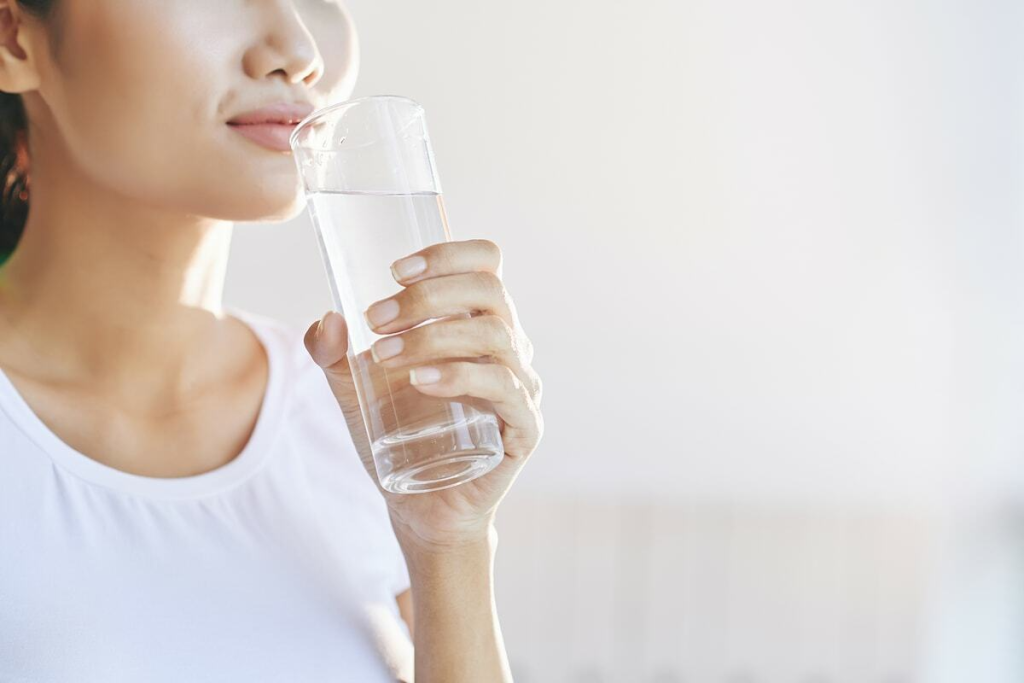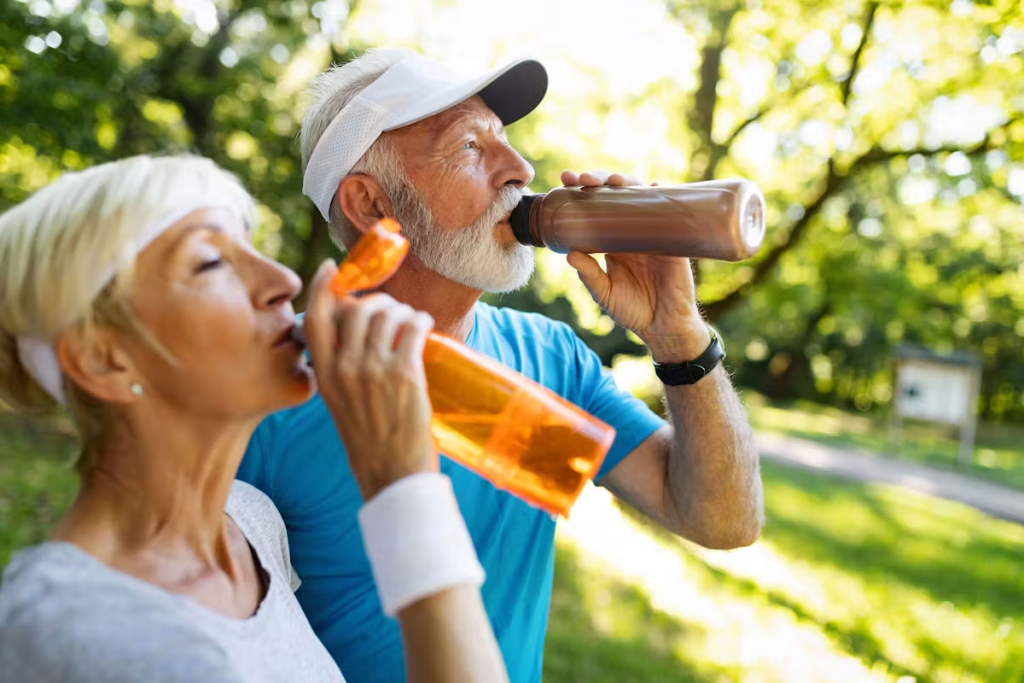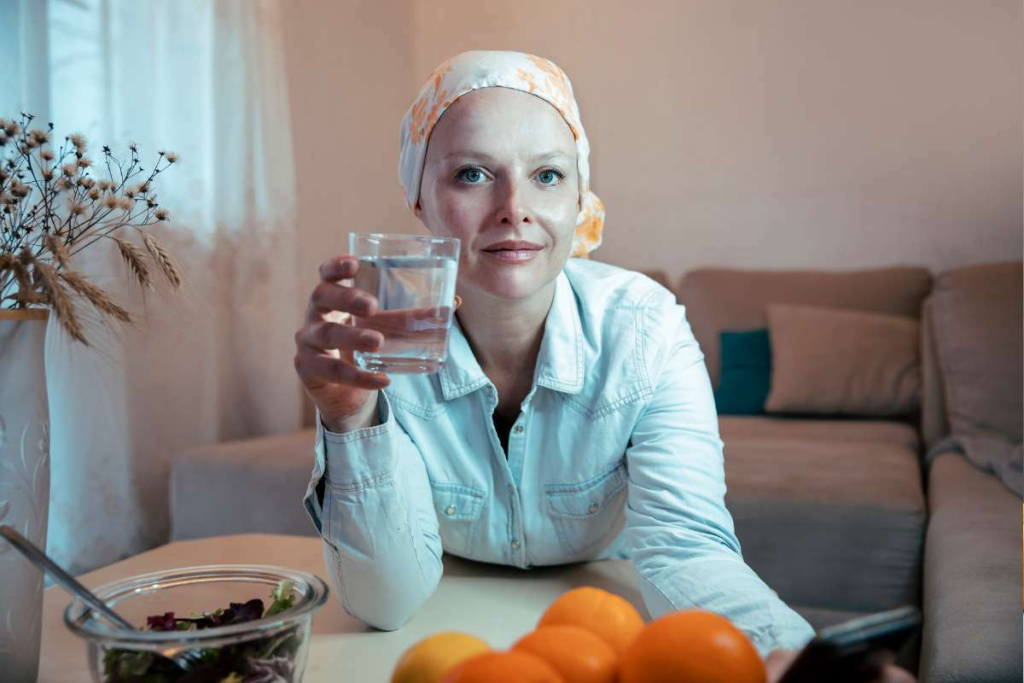What is the best water to drink during chemo? Find out is liquid IV bad for your kidneys and get the crucial advice on hydration. Powerful information for patients.
Choosing the best water to drink during chemotherapy is key. It can greatly affect your treatment’s success, how you feel, and your overall health. It’s important to drink the right water to help your treatment and keep you healthy.
The American Cancer Society says patients should be careful about their water. They should drink clean, filtered, and preferably deuterium-depleted water. Studies show that deuterium-depleted water (DDW) can make chemotherapy work better and lessen side effects.

Staying hydrated is key for those going through chemotherapy. The treatment can cause dehydration due to side effects like sweating, vomiting, and diarrhea. This can raise the risk of complications and slow down recovery.

Chemotherapy can lead to dehydration through side effects. Sweating, vomiting, and diarrhea are common and cause fluid loss. Some treatments also cause fatigue and dry mouth, making it tough to stay hydrated.
Patients should know about these side effects and take steps to manage them. Drinking lots of clean water helps reduce fatigue and protects the kidneys.
Dehydration can be serious for chemotherapy patients. It can cause increased fatigue, kidney damage, and a higher risk of infections. It can also make other side effects worse, like nausea and vomiting.
To avoid these issues, staying hydrated is vital. Drinking enough water and eating foods that help with hydration are important. Foods like watermelon and cucumbers are good choices because they are full of water.
Different types of water have different levels of purity and health benefits for cancer patients. It’s important to choose the right water to stay hydrated during chemotherapy.

Tap water is usually safe if it comes from a city supply. But, using a filter can add extra protection against harmful substances.
Benefits of Filtered Water:
Bottled water is also an option for cancer patients. But, it’s important to know how the water was purified.
Key Considerations:
Alkaline water has become popular, but its benefits for cancer patients are mostly unproven. There’s not enough scientific evidence to support its claims.
Facts to Consider:
In conclusion, knowing about the different types of water can help cancer patients make better choices. While tap water is usually safe, filtered and bottled water can offer more purity. Alkaline water, though popular, needs more research to prove its benefits.
Deuterium-depleted water (DDW) is a new hope for cancer patients. It’s a special water with less deuterium, a heavy hydrogen isotope. This water might help support cancer treatment.
Deuterium is a heavy isotope of hydrogen found in all water. DDW is water with less deuterium. Studies suggest it could help cancer cells grow less.
DDW has less deuterium than regular water. Regular water has about 150 parts per million (ppm) of deuterium. DDW has less than 100 ppm. This could help cancer patients by making their environment less friendly to cancer cells.
Some key differences include:
DDW is not as common as regular water. You can find it in some health stores or online. The price varies based on the brand and how it’s made. It’s usually pricier than regular water because of the special process.
When considering DDW, patients should be aware of the following:
Understanding DDW and its benefits is key. Talk to a healthcare professional before adding it to your treatment plan. They can help decide if it’s right for you.
Research shows Deuterium-Depleted Water (DDW) helps cancer patients during chemotherapy. We’ll look at recent studies and how DDW can help with traditional treatments.
A study in Hungary, published in 2024, found DDW benefits for cancer patients. It showed patients drinking DDW had better survival rates than those drinking regular water. This study is a strong proof of DDW’s benefits in cancer treatment.
Randomized trials also support DDW’s benefits. These trials found patients drinking DDW had improved partial response rates and one-year survival rates without major side effects. This is good news for those undergoing chemotherapy, as it means a better chance of recovery.
“The use of DDW in cancer treatment represents a promising avenue for improving patient outcomes. The evidence from both long-term studies and randomized controlled trials supports its benefits.”
Expert Opinion
It’s important to understand how DDW works in cancer treatment. DDW has less deuterium than regular water. Deuterium, a hydrogen isotope, can help cancer cells grow. By lowering deuterium levels, DDW may hinder cancer cell growth.
As research goes on, it’s clear DDW can support cancer treatment. Adding DDW to their hydration, patients might see better treatment results and a better quality of life.
Staying hydrated is key when dealing with chemotherapy side effects. There are several ways to do this. It’s important to drink enough water and avoid side effects.
People getting chemotherapy should drink 10-12 glasses of water a day. This is a good starting point. But, how much you need can change based on your treatment, health, and how active you are.
To make drinking water easier, try these tips:
When you drink water matters as much as how much. Here’s what we suggest:
It’s important to check if you’re drinking enough water. Look for these signs of good hydration:
If your urine is dark, you feel dizzy, or your mouth is dry, you might need more water.
Using these hydration tips can help chemotherapy patients stay hydrated. This might make side effects less severe.
Many cancer patients ask, is Liquid IV bad for your kidneys?. Patients with cancer often look for ways to stay hydrated. But, they might worry about using products like Liquid IV. Staying hydrated is key during chemotherapy, and products like Liquid IV help with that. Yet, it’s important to think about how these products might affect the kidneys.
Products like Liquid IV are made to keep you hydrated. They have sodium, potassium, and other important electrolytes. Knowing what’s in these products and how they might affect your body is important, even more so when you’re going through cancer treatment.
Key components of electrolyte solutions:
Chemotherapy can really affect the kidneys. The kidneys help filter waste from the blood, and chemotherapy can make them work harder. It’s important for patients to keep an eye on their kidney health and talk to their doctor about it.
Chemotherapy’s impact on kidneys:
If you’re using products like Liquid IV during cancer treatment, talk to your doctor first. It’s important to know how your kidneys are doing and any risks from the product’s ingredients. Doctors can give you advice on staying hydrated and watching your kidney health during treatment.
Guidelines for safe use:
By knowing what’s in electrolyte solutions, understanding how chemotherapy affects the kidneys, and following safe use guidelines, cancer patients can make smart choices about staying hydrated during treatment.
Eating foods with lots of water can help with dehydration during cancer treatment. Good nutrition is key for staying hydrated and healthy while getting chemotherapy.
Some foods are great for keeping you hydrated. These include:
These foods help with hydration and give you important nutrients. They support your health during chemotherapy.
Watermelon is a great choice for staying hydrated. It has about 92% water, making it very hydrating. It also has vitamins A and C, and lycopene, which is good for health.
Eating watermelon during chemotherapy can help with hydration. It also gives you important vitamins and minerals.
To focus on hydration in your diet, do this:
By choosing the right foods, you can manage dehydration better. This supports your health during chemotherapy.
For those undergoing chemotherapy, drinking water is more than just a need; it’s a must. Adding healthy ingredients to your water can help you stay hydrated. This is key during treatment.
Adding lemon or lime slices to your water is a simple yet effective way to make it better. These citrus fruits add flavor and boost vitamin C levels. Fresh mint leaves are another great option, making your water refreshing and tasty.
Cucumber slices are also a good choice. They’re full of water and electrolytes, helping with hydration. You can also try orange or grapefruit slices for a new taste.
Herbs and natural additives can make your water taste better and be more nutritious. Some popular ones include:
You can also add honey or agave syrup in small amounts. These sweeteners can make your water sweeter. But, be careful not to add too much because of their sugar content.
It’s important to choose the right additives for your water. Avoid products with artificial flavorings or preservatives. Instead, go for natural and organic options.
Be careful with products that claim to “alkalize” your water. The science behind these claims is not strong. Always check the ingredients and look for third-party certifications to ensure safety and effectiveness.
By carefully choosing what you add to your water, you can make hydration during chemotherapy more enjoyable and healthy.
Staying hydrated is key during chemotherapy. Drinking different beverages can help meet hydration needs. Water is the main source, but other drinks offer nutrients too.
Juices are great for staying hydrated and getting nutrients during chemo. Here are some top juices for chemo patients:
Not all drinks are good for chemo patients. It’s important to know which ones help and which ones don’t.
Drinks to embrace include:
Drinks to avoid or limit are:
Having a hydration schedule is important for chemo patients. Here are some tips:
By drinking a variety of hydrating beverages and following a hydration schedule, chemo patients can manage dehydration better. This supports their treatment.
Keeping hydrated during cancer treatment is key, but it’s hard for many patients. Chemotherapy can cause side effects that make drinking water tough. We’ll look at these issues and share ways to beat them.
Chemotherapy often changes how things taste, making it hard to drink enough. To help, try drinking water at different temperatures or add lemon, lime, or cucumber slices. Trying new flavors can make drinking water more fun.
Some people like cold drinks, while others prefer them warm. Avoiding drinks with strong smells can also help with taste changes.
Nausea and vomiting make it hard to stay hydrated during chemo. To fight these, take small sips of clear or electrolyte-rich drinks like broth or sports drinks. Ginger tea or ginger ale can also help with nausea.
Keep an eye on how much you’re drinking if you’re feeling sick. If it doesn’t get better, talk to your doctor for help.
Some patients have trouble swallowing during chemo. To make it easier, try smoothies or pureed soups. Using a straw can also help.
Adjusting your diet to include hydrating foods like watermelon or cucumbers can also help. These foods are easy to eat and keep you hydrated.
By tackling these common hydration problems, patients can stay hydrated during chemo. This helps them do better in their treatment.
Drinking enough water is key to helping with chemotherapy and better health. Choosing the right water and using good hydration tips can really help. This can make a big difference in how well treatment works.
We’ve looked at why staying hydrated is important, the different types of water, and how to handle hydration issues. Deuterium-depleted water (DDW) is a good choice, as studies show it helps in cancer treatment.
To get the most out of hydration, patients should drink enough water each day. They should also keep an eye on how well they’re staying hydrated. Eating foods that help with hydration is also important.
Knowing how important hydration is and making smart choices can help improve treatment results. This can make life better for people with cancer who are getting chemotherapy.
The best water for chemotherapy patients is clean and filtered. Deuterium-depleted water (DDW) is also recommended. It helps chemotherapy work better and reduces side effects.
Chemotherapy can cause dehydration. This is because it leads to sweating, vomiting, and diarrhea. These symptoms can increase the risk of complications.
Dehydration can cause fatigue and kidney damage. It also slows down recovery. Staying hydrated is key to avoiding these problems.
Tap water is usually safe if it’s from a good source. But, using a filter can protect against harmful contaminants.
DDW has less deuterium, a heavy hydrogen isotope. It’s different from regular water. Studies show it helps chemotherapy work better.
Alkaline water’s benefits for cancer patients are mostly based on stories. There’s no strong scientific proof. Always talk to a doctor before trying it.
Liquid IV can help with dehydration. But, it’s important to think about its effect on the kidneys. Always check with a doctor first.
Foods like watermelon are good for staying hydrated. A diet plan focused on hydration can help your health and treatment.
Yes, watermelon is great for dehydration during chemotherapy. It’s full of water and nutrients.
Adding herbs and natural ingredients can make water taste better and more nutritious. Just make sure they’re safe and free from harmful substances.
Chemo patients should drink juices that are full of nutrients and easy to digest. Always talk to a doctor to find the best options.
To manage hydration challenges, you can try different things. This includes dealing with taste changes and finding ways to overcome nausea and vomiting. Getting help from professionals is important.
When dehydrated, drink clean, filtered water and electrolyte solutions. Some juices are also good. Having a hydration plan can help with treatment.
Subscribe to our e-newsletter to stay informed about the latest innovations in the world of health and exclusive offers!
WhatsApp us